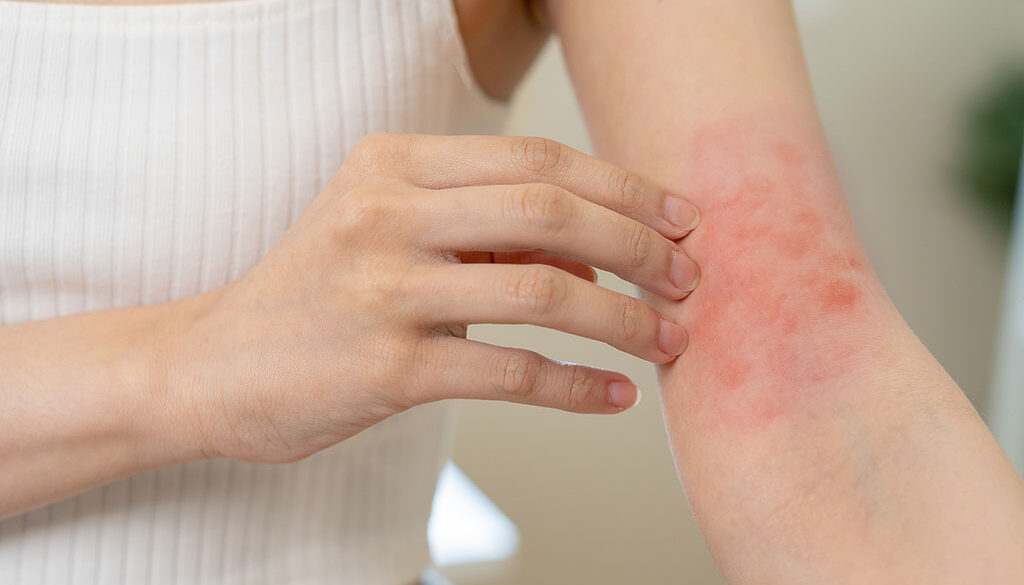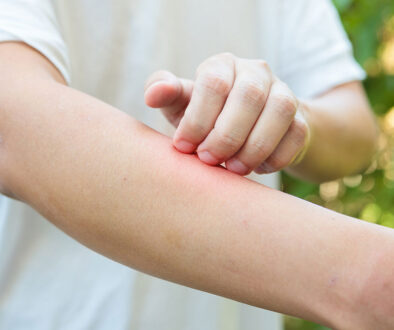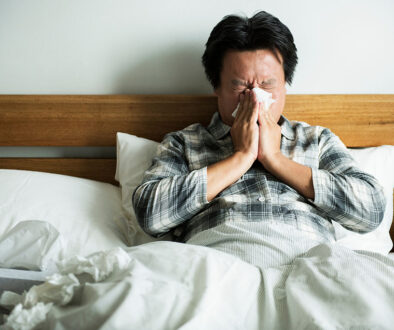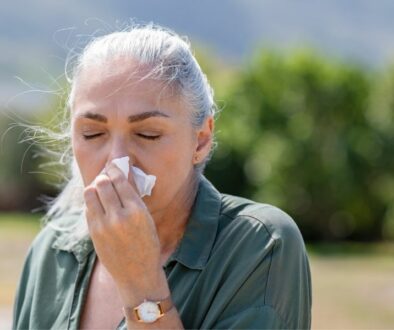Our 5 Effective Solutions for Hives Caused by Allergies
In this article:
If you have allergies and you’re experiencing a hives breakout, you may be dealing with redness, swelling and itchy welts on your skin. Moderate to severe itching is one of the most annoying symptoms of hives caused by allergies, and it can disrupt your sleep and impact your daily life.
At Raleigh Medical Group, we understand that hives and allergies make it difficult for you to complete everyday tasks. That’s why we have a team of caring professionals ready to help you through timely, individualized treatment plans. To find relief from troublesome allergy symptoms like hives, contact us for an appointment.
In this article, we’ll review types of allergies that can cause hives, consider how you can treat hive allergy breakouts at home, and address when you should see a health care provider for allergy hives.
Hives Caused by Allergies: Which Types of Allergies Trigger Hives?
Hives, also known as urticaria, are a common skin reaction that affects 20 percent of people at some point in their lives. They appear as raised, itchy bumps or welts that can be red or skin-colored. Hives are often triggered by allergens, a substance that causes an allergic reaction.
Substances that can cause allergic hives include:
- Animal dander, particularly from cats and dogs
- Antibiotic medications such as penicillin and sulfa drugs (used to treat bacterial infections)
- Certain foods such as peanuts, eggs, nuts, fish and shellfish, and other foods
- Insect stings or bites
- Latex
- Over-the-counter pain relievers like aspirin and ibuprofen
- Plants, including poison ivy, oak and sumac
- Pollen
Hives are not always triggered by allergens. Sometimes they are caused by other factors such as:
- Bacterial infections like urinary tract infections or strep throat
- Blood transfusions
- Emotional stress
- Exercise
- Extreme cold or sun exposure
- Viral infections such as the common cold, mononucleosis or hepatitis
While not common, immunizations can also be associated with the development of hives, as some vaccine components can trigger an allergic reaction.
Be sure you’re up to date on your adult immunizations and speak to your health care provider if you’re concerned about allergic reactions.
Other times, the cause of hives is unknown.
How Can I Treat Hive Allergy Breakouts at Home?
Home remedies for managing hives caused by allergies can be effective, depending on the severity of your breakout.
To treat a mild to moderate hives breakout and reduce itching and other symptoms associated with hives, you can try:
- Applying a cold, damp cloth to the affected area
- Avoiding hot baths or showers, which can worsen itching and swelling
- Avoiding known triggers
- Over-the-counter antihistamines such as Benadryl, Zyrtec, Allegra, or Claritin
- Protecting your skin from the sun with sunscreen and protective clothing
- Stress reduction techniques, such as meditation and deep breathing
- Taking a cool bath to help soothe skin and relieve itching
- Wearing loose-fitting clothing to prevent skin irritation
Hives are usually harmless and not a cause for concern. If your hives are mild, they may go away on their own without treatment.
What Are the Best Topical Treatments for Hives?
Over-the-counter topical treatments for hives include calamine lotion, hydrocortisone creams, anti-itch creams containing menthol, or Benadryl cream, among others.
Depending on the severity of your hives, your allergist or dermatologist can also recommend prescription-strength topical treatments, which may include corticosteroids and doxepin cream.
When Should I Seek Medical Help for Allergy Hives?
If your hives are persistent, severe or don’t respond to any of the approaches above after a few days, see your healthcare provider.
Call 911, have someone else call, or go to an emergency room immediately if you experience:
- Difficulty breathing
- Dizziness or fainting
- Swelling of the face, lips or tongue
- Throat tightness
- Wheezing
These symptoms may indicate anaphylaxis, which can be life-threatening and requires immediate medical attention.
Are Your Allergy Symptoms Making You Miserable? Raleigh Medical Group is Your Home for Effective Relief
Whether your symptoms are mild, moderate or severe, allergies can disrupt your daily life. If you’re seeking relief from hives caused by allergies, we can help. We’ll discuss treatment options, including immunotherapy, medications or topical approaches to determine what’s best for you.
We invite you to schedule an appointment with us and see why we’re the area’s premier medical provider.
Key Takeaways:
- Hives caused by allergies can cause severe itching and other symptoms that make it difficult to function in everyday life.
- Hives can be triggered by:
- Animal dander
- Certain medicines
- Insect stings
- Certain foods
- Plants
- Pollen
- Bacterial or viral infections
- Emotional stress
- Sometimes, there is no clear cause of hives.
- Some effective solutions for hives include:
- Applying a cold, damp cloth
- Taking antihistamines
- Taking cool baths
- Avoiding sun exposure
- If your hives are severe and making it difficult to breathe, call 911 immediately.
The content within this article and others on this website is only for educational purposes and should not be considered medical advice. For any questions or concerns, please consult with your healthcare provider.
======
Sources:
American College of Allergy, Asthma and Immunology (ACAAI.org), “Hives,”
https://acaai.org/allergies/allergic-conditions/skin-allergy/hives/
Mayo Clinic, “Latex Allergy,” https://www.mayoclinic.org/diseases-conditions/latex-allergy/symptoms-causes/syc-20374287
Penn Medicine.org, “Hives,” https://www.pennmedicine.org/for-patients-and-visitors/patient-information/conditions-treated-a-to-z/hives




